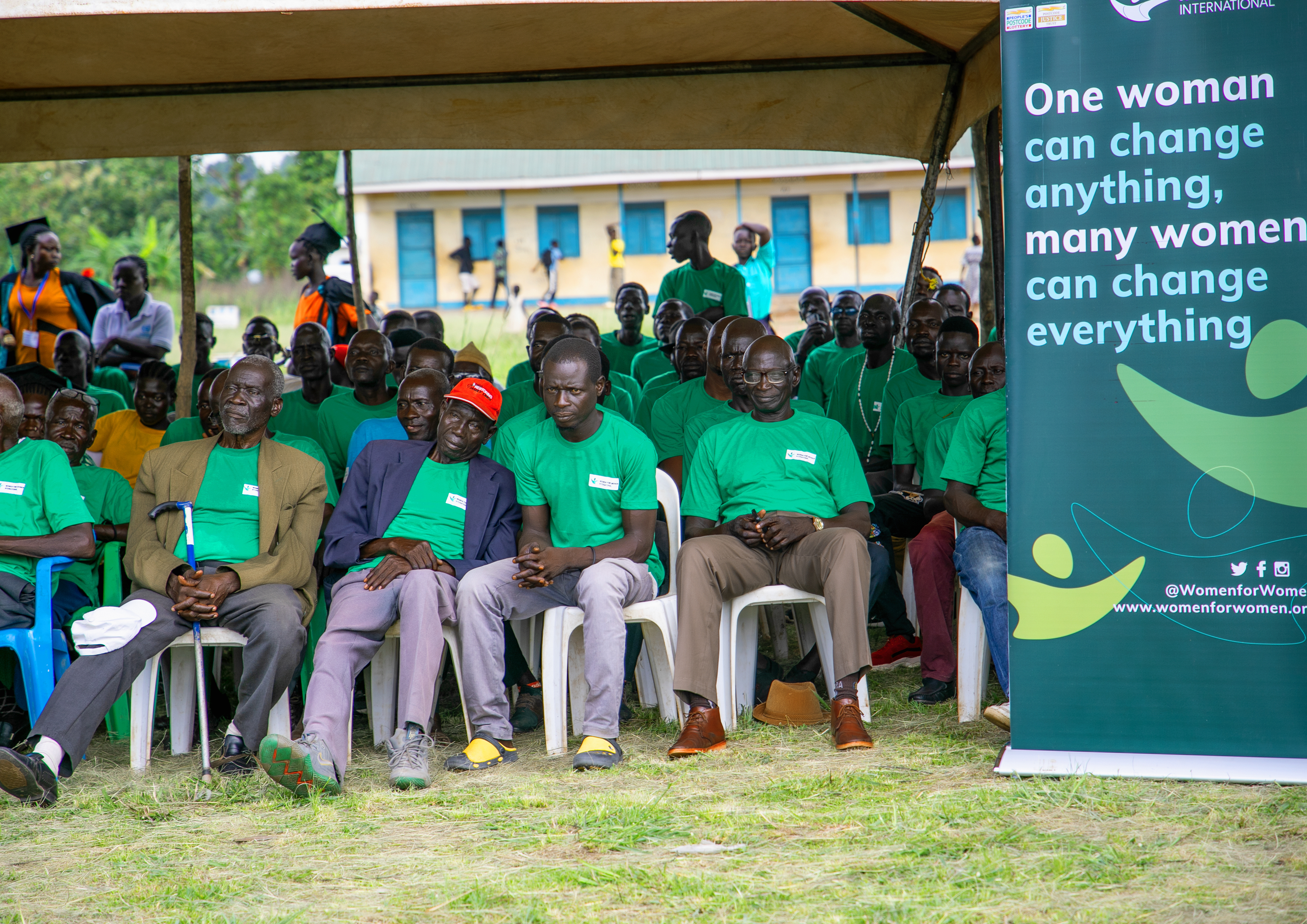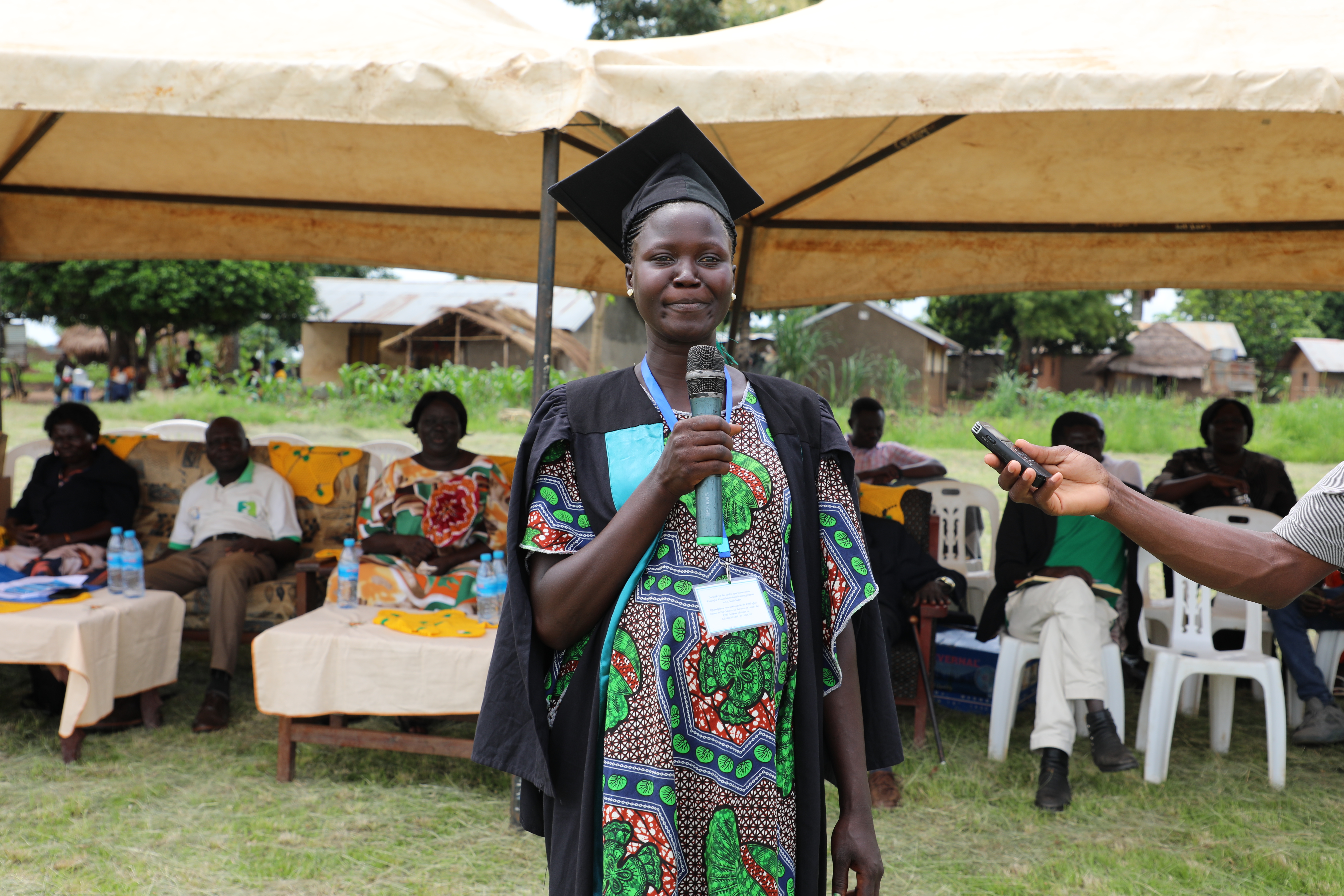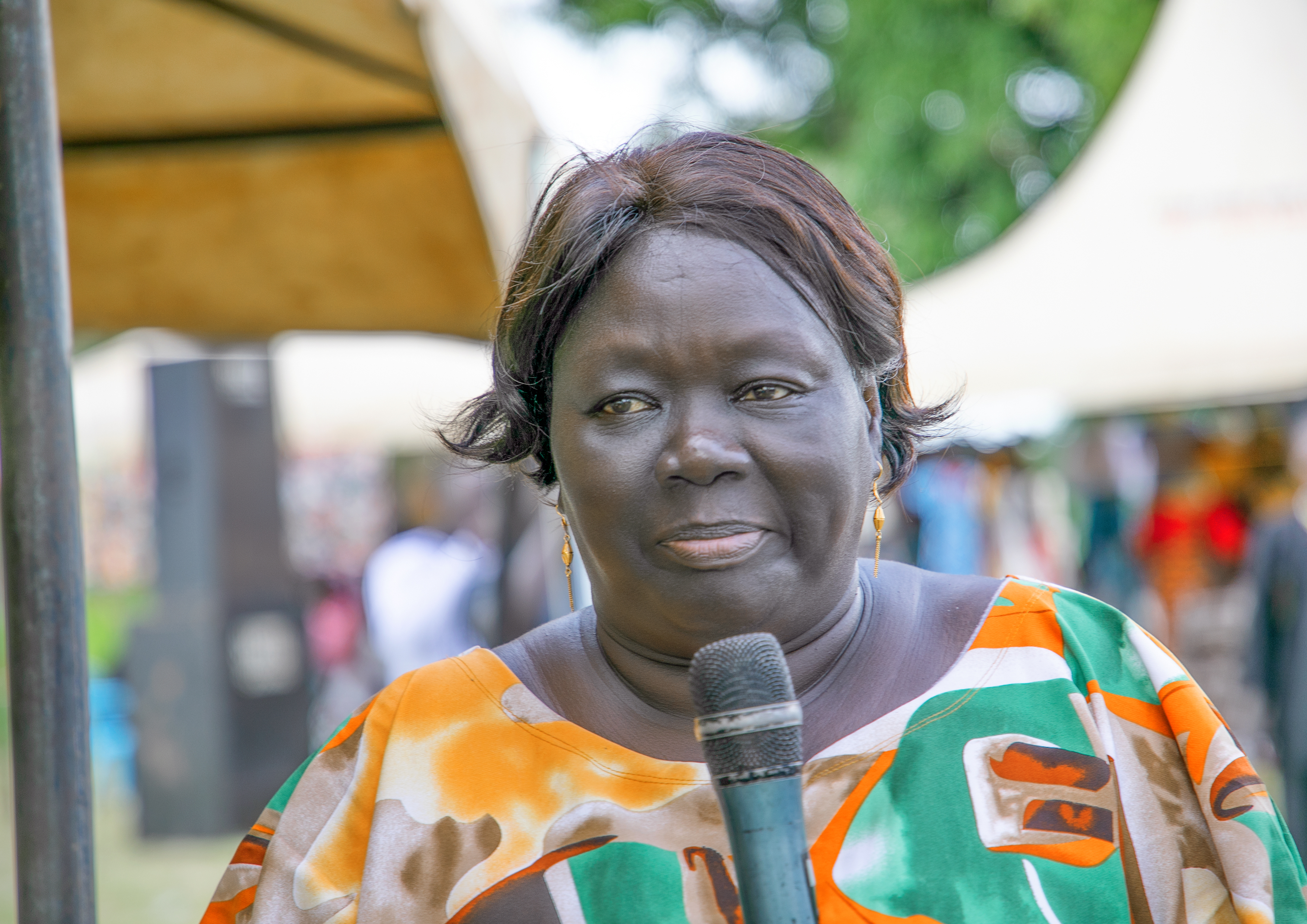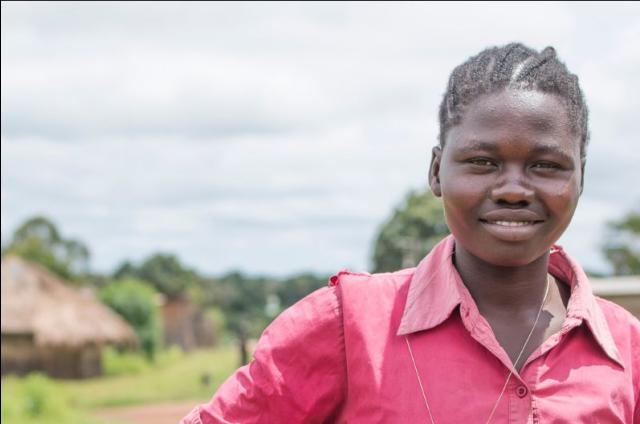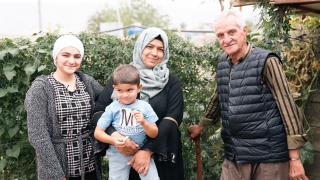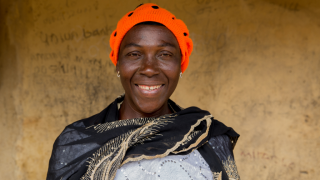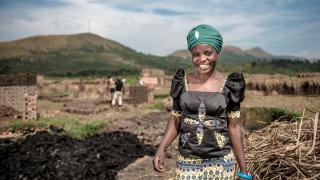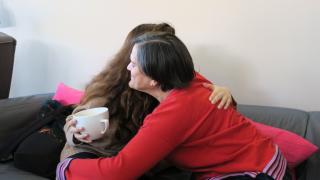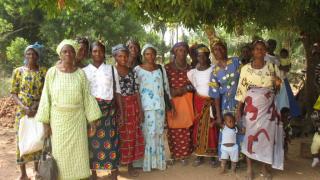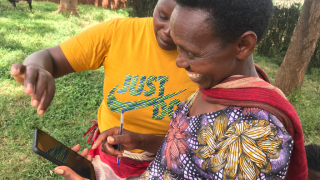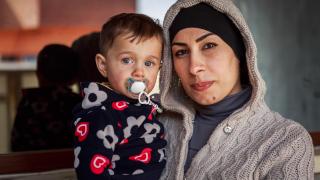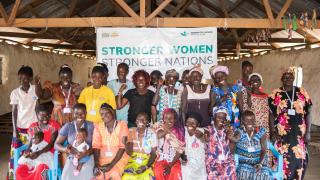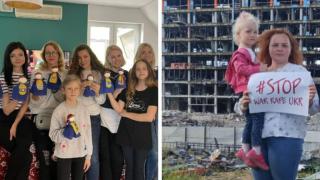Transforming Lives Together: Couples Connect in South Sudan
Transforming Lives Together: Couples Connect in South Sudan
Women for Women International is helping families transform their lives by fostering teamwork, financial independence and modern farming techniques - by piloting agricultural vocational training for couples
This innovative approach is part of our revised Men's Engagement Programme curriculum and encourages couples to work together, ensuring a better future for their families.
Here’s how the Couples Connect sessions are making a difference in Betty's life, and many others:
Betty's journey
moving forward after displacement
Displaced from her village during the 2016 crisis in South Sudan, Betty moved to the Ronyi Boma administrative division in Yei River County with her husband and their three children.
We lacked food, the children were constantly sick due to poor nutrition, and they often missed school.
To make ends meet, Betty borrowed money, sold firewood and opened a small restaurant. Farming, her true passion, was yielding little with her traditional methods due to the poor land conditions.
In March 2023, everything changed when Betty and joined our Stronger Women, Stronger Nations programme and participated in the pilot sessions for couples.
This pilot initiative aims to evaluate if couples' vocational training can lead to stronger economic outcomes for women compared to women-only vocational training. In addition to the standard agricultural training, which includes modern farming methods, the couples’ training has been adapted to:
- Educate men and women together on how to think about gender-sensitive divisions of labour
- Promote the equitable management of resources
- Foster gender awareness and an understanding how an agricultural family business operates
Each participant received a monthly stipend, a grant upon graduation to start-up their agricultural business, and farming tools and seeds.
Betty’s story is a testament to the pilot's positive outcomes for women:
With the new farming skills acquired, my husband and I embarked on joint farming.
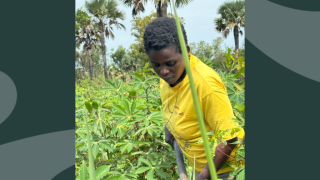
She continued, "He helped us get this large piece of land, and we applied all the new skills - from land preparation to harvesting and selling our products."
Today, my husband and I understand soil types, seasons and crop care. Our farm is thriving.
Betty's garden produce is sufficient to sustain her and her family, put her children through school and save for future needs.
She shared: "In my most recent harvest, I collected 4 basins of onions, 3 bags (50 kg) of peanuts, four basins of peas, and 4 bags of cassava. I am also now great at farm product business."
I would never have managed even half of this without the training and support from Women for Women International.
Changing Perspectives: A Husband’s Story
Engaging men in women's rights and power
For the men joining our Couples Connect vocational agricultural training, these sessions form part of a wider Men’s Engagement Programme curriculum, which is helping change patriarchal traditional norms and the perspectives of men in the community.
We spoke to Mawa, a programme participant, who joined our Couples Connect pilot sessions with his wife. He admitted that he had been a traditional, authoritarian husband, and that our programme helped him become a more supportive partner. As the training progressed, he began to appreciate his wife’s contributions and says he learnt the value of working together.
Today, my wife is the major breadwinner, and I support her in every way I can.
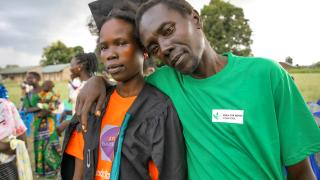
Mawa told us:
"In the programme, we learned about working together as a family, sharing responsibilities, communication in marriage, problem-solving and financial management.
Soon, I began to see reason in everything my wife was doing and I grew to appreciate her efforts in supporting me. Gradually, we started communicating again, and we would talk about business, farming and our family.
I started supporting her business, and we started working together."
Couples Connect Pilot: inital impact
more than training
The Couples Connect vocational training pilot, paired with our wider Stronger Women, Stronger Nations and Men's Engagement programming, appears to be leading to positive outcomes for couples in South Sudan.
We are in the process of conducting an internal evaluation that will be published later in the year to fully assess the success of the pilot approach. For the time being, this initiative is empowering couples to work together to:
- Enhance family unity: Couples learn to communicate effectively and share responsibilities, strengthening their family bonds.
- Promote financial independence: Participants gain financial management skills and receive grants to start or expand their businesses.
- Encourage modern farming techniques: Couples are trained in modern, practical farming methods to improve crop yields and food security.
- Foster community development: As families thrive, entire communities benefit from increased stability and economic growth.
Betty and Mawa’s stories highlight the impact of this new pilot in South Sudan.
Women for Women International is committed to engaging more couples in South Sudan and beyond. It is with thanks to our global community of supporters that this vital work is possible, helping families build a better future together.
keep reading
The Courage Behind Leila's Smile
subtitle:
In 2018, Leila's village in Damascus, Syria was bombed, killing two of her children and injuring her daughter so badly that she still struggles to walk properly today. Despite their injuries, Leila and her daughter made the difficult to decision to leave their home and seek asylum in the Kurdistan Region of Iraq. In the face of immense grief, Leila knew that she needed to move forward for the sake of her family.
On paper, it might seem as though women's rights are protected in Nigeria. But today, Nigerian women and girls continue to face the reality of widespread discrimination, violence and injustice. To understand why urgent change is needed, read these 10 key facts about women's rights in Nigeria.
My Name is Cinama
subtitle:
After graduating from our 12 month programme in the Democractic Republic of Congo, Cinama went on to start her own brickmaking business. She now shares her knowledge with other women and is looked up to as a role model.
More than one year on from Russia's brutal invasion of Ukraine and our Managing Director, Sara Bowcutt, shared her reflections with Seida Sarić, Director of Žene za Žene International), our sister organisation in Bosnia and Herzegovina, and Kateryna Shukh, Vice President of Bereginja – Mariupol’s Women’s Association.
The UK Government recently published two long-awaited policies, reflecting how collective and sustained advocacy - anchored in women’s experiences - can contribute to small wins in a broader context of a global rollback on women’s rights, no matter how painstaking those advocacy efforts or granular those wins may feel. So, what are those small wins, and are they worth celebrating?
Across the world, women often have less access to technology, mobile phones and the internet compared to men. In fact, the majority of the 2.9 billion people who remain unconnected are women and girls. But evidence suggests that digital inclusion goes hand in hand with economic empowerment and gender equality.
20 years since the war broke out in Iraq, we reflect on the impact of the war on women, our support over the years and hopes for the future.
Women for Women International invests in the power of women living in these communities. As we celebrate Women's History Month, we reflect on the progress of women using their #PowerToChange in their lives and communities for generations to come.
This International Women’s Day, we are heartened to have the support of our passionate partners and global community in creating the changes we want to see in the world. From beauty to dining to fashion and jewellery, there are many ways to invest in the strength of women, while sharing a gift or choosing a special item for yourself.
In the early hours of February 24, 2022, a televised announcement by Russian President Vladmir Putin would ignite a “special military operation” in Ukraine. Citing his objectives of the country’s “demilitarisation” and “denazification”, his words signaled the siege of key Ukrainian cities by Russian military forces and upended the lives of Ukrainian men, women, and children.
In Mariupol, Olga sang pop and folk music with her group, Melody, who made it onto Ukrainian X-Factor and her husband was the Head of Mariupol’s orchestra. When war broke out, Olga made the perilous journey across the border to Poland with her son, Max, and her parents. Her husband stayed behind in Ukraine.
Women's History Month Reading List
subtitle:
This Women's History Month, get inspired by these female authors who are using their #PowerToChange to bring awareness to injustice, inequality and the incredible resilience of women.

